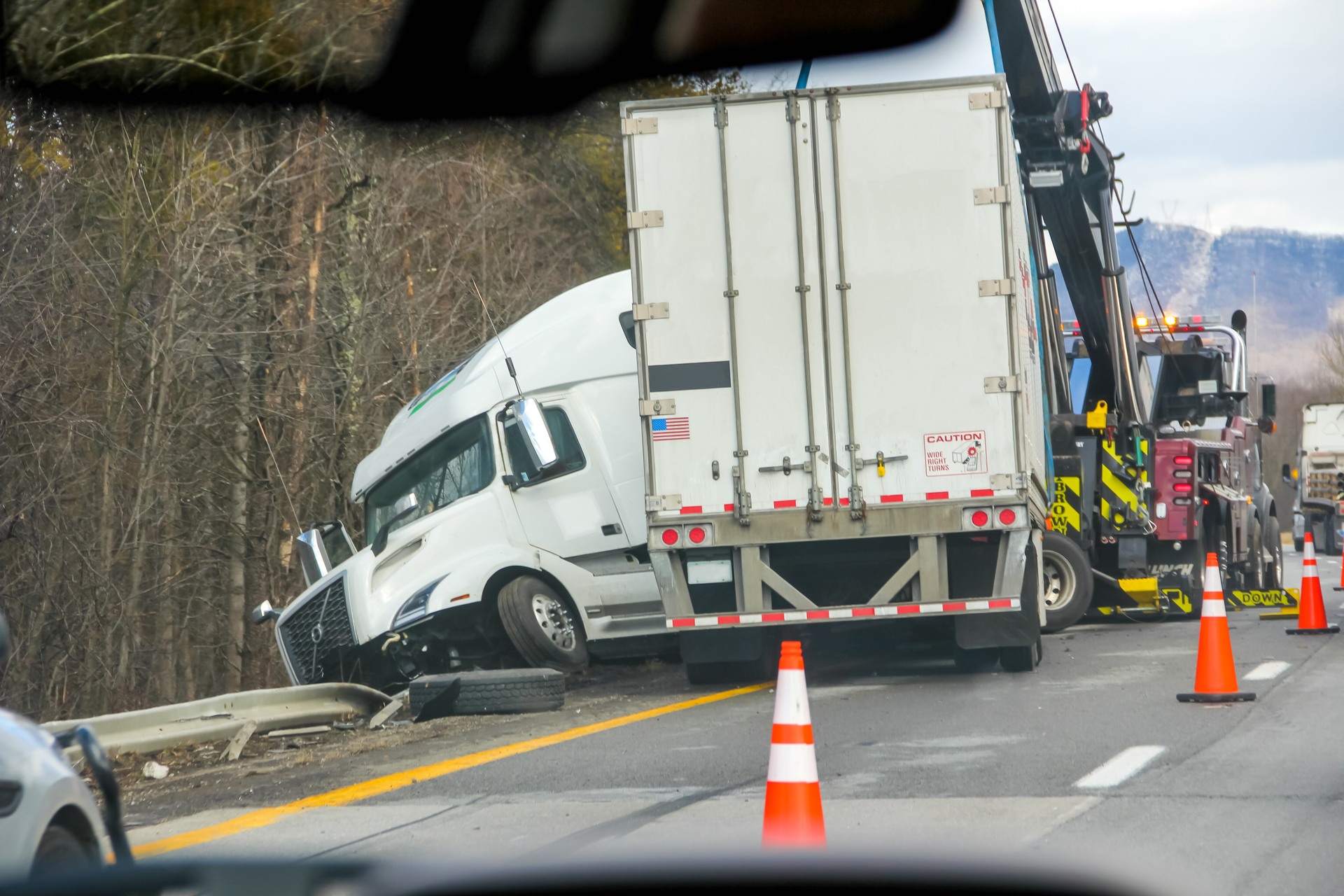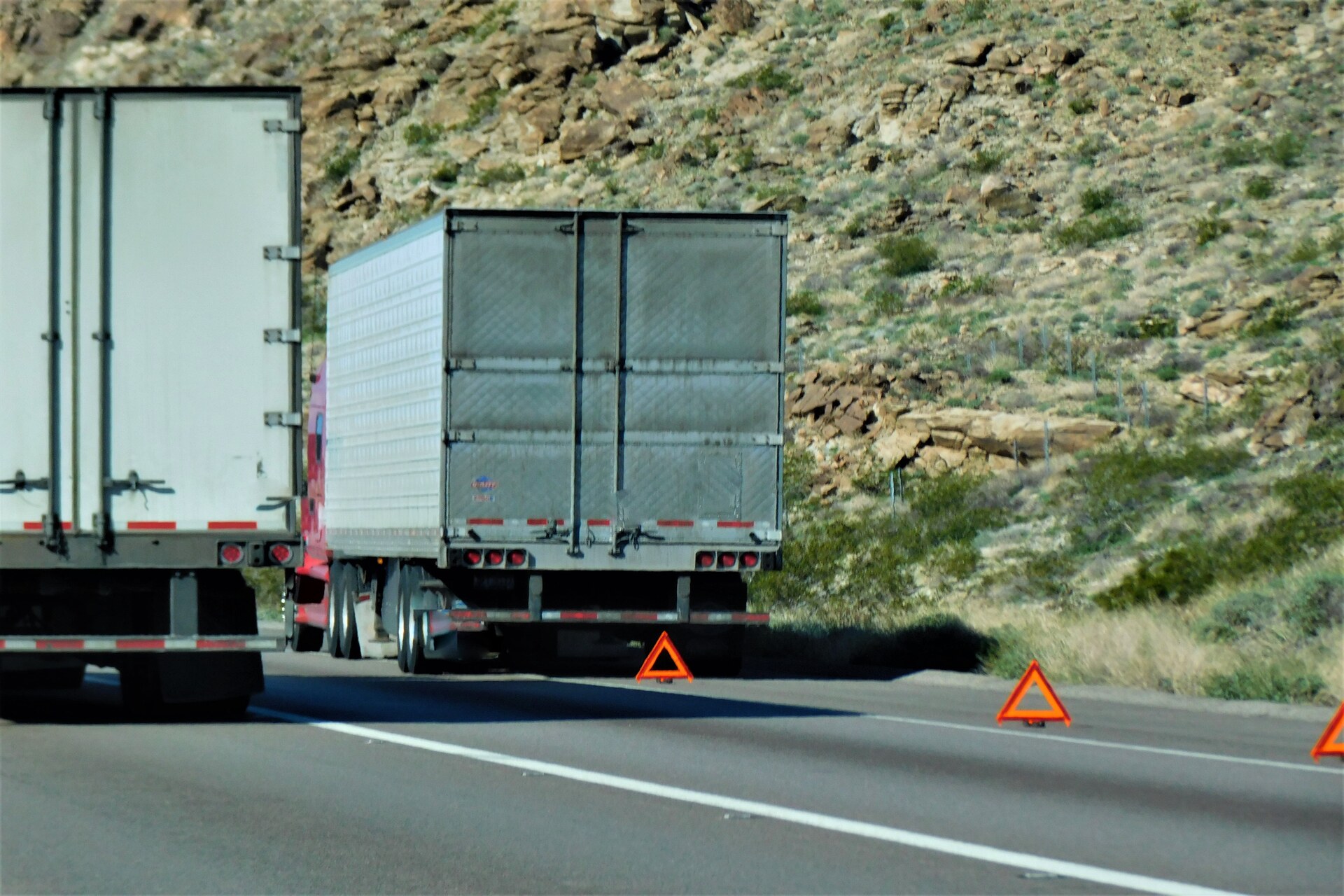lmccullough@hawklawgroup.com | May 8, 2025 | Truck Accident

When you’re involved in a collision with an 80,000-pound commercial truck, the consequences are often devastating. Unlike typical car accidents, truck crashes involve complex liability issues that can significantly impact your ability to recover fair compensation.
At Hawk Law Group, we understand the challenges you face after a truck accident. Our trial attorneys have over 71 years of combined experience fighting for Georgia accident victims, and we’ve recovered hundreds of millions in compensation. We’ll help you manage the complicated web of potential liable parties and fight for the justice you deserve.
Local expertise matters. Hire our Augusta Truck Accident Lawyer who knows the terrain.
Understanding Truck Accident Liability in Georgia
Truck accidents differ significantly from regular passenger vehicle crashes. Commercial trucking operates under specific federal and state regulations, involves multiple potential defendants, and typically results in more severe injuries.
Who can be held liable in a truck accident?
In Georgia truck accidents, liability often extends beyond just the driver. Several parties may share responsibility:
- Truck driver – When drivers violate safety regulations, drive distracted, or operate while fatigued
- Trucking company – Through negligent hiring, inadequate training, or encouraging hours-of-service violations
- Vehicle or parts manufacturer – If defective components contributed to the crash
- Maintenance provider – When poor maintenance causes mechanical failures
- Cargo loader or shipper – For improperly secured loads that shift or fall
- Government entity – If road hazards or poor design contributed to the accident
💡 Truck crashes often involve multiple layers of responsibility, including federal regulations, corporate oversight, and mechanical compliance, a factor that makes early legal intervention even more essential.
Multiple party liability
Georgia law recognizes that multiple parties can share responsibility for a single accident. This concept, known as joint liability, means truck accident victims can potentially recover compensation from several sources.
Example scenario: A driver exceeding their legal hours of service falls asleep at the wheel, but inspection reveals the truck’s brakes were also improperly maintained. Both the driver and the maintenance company could share liability in this case.

Common Factors That Determine Fault in Georgia Truck Crashes
Knowing what causes truck accidents helps identify who should be held responsible. Here are the most common factors that determine liability:
Truck driver negligence
Driver fatigue remains one of the leading causes of truck accidents. The Federal Motor Carrier Safety Administration (FMCSA) regulates how many hours truckers can drive, but these rules are sometimes violated. According to the Federal Motor Carrier Safety Administration, driver fatigue contributes to approximately 13% of commercial vehicle crashes in the U.S..
Other common forms of driver negligence include:
- Speeding or driving too fast for conditions
- Distracted driving (texting, adjusting GPS, etc.)
- Driving under the influence of drugs or alcohol
- Following too closely
- Improper lane changes
Trucking company negligence
Trucking companies have a legal responsibility to ensure their operations are safe. They can be held liable for:
- Negligent hiring practices – Failing to properly screen drivers or check driving records
- Inadequate training – Not providing proper instruction on safety protocols
- Encouraging violations – Pressuring drivers to meet unrealistic schedules
- Poor supervision – Not monitoring drivers’ compliance with regulations
Vicarious liability means trucking companies are often responsible for their employees’ actions while on the job. This legal doctrine makes the company liable even if they weren’t directly negligent.
Manufacturer or mechanical failure
When truck parts fail, the manufacturer may be held responsible through product liability laws. Common mechanical issues include:
- Brake failures
- Tire blowouts
- Steering malfunctions
- Transmission problems
- Headlight or taillight failures
Defective brake components are particularly dangerous in commercial vehicles, as the massive weight of these trucks requires properly functioning braking systems to stop safely.
Improper cargo loading
Cargo that isn’t properly secured can shift during transit, potentially causing the driver to lose control. Liability may extend to:
- The company that loaded the cargo
- The shipper who prepared it for transport
- The carrier responsible for ensuring load security
The Georgia Department of Transportation requires all commercial loads to be properly secured according to specific guidelines.
Roadway hazards and government liability
Sometimes, road conditions contribute to truck accidents, including:
- Poorly designed intersections or merges
- Inadequate signage
- Unrepaired potholes or damaged roadways
- Construction zones without proper warnings
While government entities can be held responsible, Georgia’s sovereign immunity laws create strict deadlines and limitations for these claims. You typically have just 12 months to file a notice of claim against a government entity.
Additional reading: at fault accident Georgia
Facing mounting bills after a truck collision? Contact us before speaking to insurers.
How Georgia’s Comparative Negligence Law Affects Your Case
Georgia follows a modified comparative negligence rule, which means your compensation can be reduced by your percentage of fault in causing the accident. However, if you’re found to be 50% or more responsible, you cannot recover any damages.
Example: If you’re awarded $100,000 in damages but found 20% at fault, your compensation would be reduced to $80,000.
This makes determining and proving liability especially essential in Georgia truck accident cases.
How our Georgia Truck Accident Lawyer Proves Liability
Establishing liability in truck accident cases requires thorough investigation and specialized knowledge. Our attorneys utilize multiple sources of evidence to build your case:
Evidence gathering
Truck accidents provide unique forms of evidence not available in regular car crashes:
- Electronic logging devices (ELDs) – Digital records of driving hours
- Black box data – Information about speed, braking, and other vehicle operations
- Maintenance records – Documentation of truck inspections and repairs
- Driver qualification files – Records of training, licensing, and driving history
- Drug and alcohol testing results – Required after most commercial truck accidents
- Bills of lading – Documentation of cargo being transported
At Hawk Law Group, we act quickly to preserve this evidence before it can be lost or destroyed. In Georgia, trucking companies may legally dispose of certain records after a specified time period unless they receive a preservation letter.
📌 Preserving black box data, driver logs, and inspection records within days of a crash is critical, don’t wait to send a preservation letter to the trucking company.
Working with experts
Complex truck accident cases often require testimony from specialists:
- Accident reconstruction experts who use physics and engineering principles to determine how the crash occurred
- Medical experts who can connect your injuries to the accident and project future care needs
- Trucking industry specialists who can identify violations of standard practices or regulations
- Accident reconstruction experts can demonstrate critical factors like a truck’s speed, braking distance, and stopping capabilities, technical evidence that can be decisive in establishing liability.
What Compensation Can You Recover After a Truck Accident in Georgia?
Truck accidents typically cause more severe injuries than passenger vehicle crashes, leading to significant damages. In Georgia, you may be entitled to recover:
| Type of Damages | What It Covers | Example |
| Medical expenses | All past and future treatment costs | Hospital stays, surgeries, rehabilitation, medication, assistive devices |
| Lost income | Wages lost during recovery and future earning capacity | Salary, benefits, retirement contributions, business opportunities |
| Property damage | Repair or replacement of your vehicle and personal property | Vehicle replacement, personal items damaged in the crash |
| Pain and suffering | Physical pain and emotional distress | Ongoing physical discomfort, anxiety, depression, PTSD |
| Loss of enjoyment | Inability to enjoy activities and hobbies | Sports, recreation, or family activities you can no longer participate in |
| Punitive damages | Additional compensation in cases of gross negligence | When a trucking company knowingly violated safety regulations |
In wrongful death cases, families may also recover for funeral expenses, lost financial support, and loss of companionship.

Why Choose Hawk Law Group for Your Georgia Truck Accident Case
💡 Hiring our local attorneys with courtroom experience and deep knowledge of Georgia’s legal landscape gives you a stronger position in both settlement and trial.
After a serious truck accident, having the right legal team can make all the difference in your recovery. Our attorneys at Hawk Law Group provide:
- Deep local knowledge – With five offices throughout the Central Savannah River Area (CSRA), we understand local courts, judges, and juries
- Trial experience – Our attorneys are respected litigators willing to take your case to trial if necessary
- Resources – We work with top experts and have the financial capability to fully investigate complex truck accidents
- Case Results – We’ve secured numerous multi-million dollar verdicts and settlements for truck accident victims
As experienced trial attorneys, we understand the devastating impact truck accidents can have on victims and their families. Our team is committed to fighting for the maximum compensation our clients deserve.
Common Scenarios Where Multiple Parties Share Liability
Knowing how multiple parties can be responsible helps illustrate the complexity of truck accident cases:
- The overworked driver scenario: A trucking company pressures its driver to meet an unrealistic delivery schedule. The exhausted driver falls asleep and crashes into your vehicle. Both the company and driver share liability.
- The maintenance failure chain: A truck’s brakes fail, causing a collision. Investigation reveals the maintenance company performed substandard repairs, the trucking company neglected required inspections, and the driver ignored warning signs of brake problems. All three parties may share responsibility.
- The dangerous road condition case: A truck driver loses control when encountering an unmarked construction zone, striking your vehicle. Liability could be shared between the driver (if speeding), the construction company (for inadequate warnings), and possibly a government entity (for improper road design).
Contact our Truck Accident Lawyer in Georgia Today
After a truck accident, you need our experienced legal representation to manage the complex liability issues and secure the compensation you deserve. The statute of limitations for personal injury claims in Georgia is generally two years, but evidence essential to your case may disappear much sooner.
The trial attorneys at Hawk Law Group will:
- Immediately work to preserve vital evidence
- Thoroughly investigate all potentially liable parties
- Aggressively negotiate with insurance companies
- Take your case to trial if necessary to secure fair compensation
We operate on a contingency fee basis, meaning you pay nothing unless we win your case.
Don’t face the trucking companies and their insurance providers alone. Contact us online or call today at (706) 722-3500 for a free, no-obligation consultation.
Frequently Asked Questions
Who is responsible in a truck accident in Georgia?
Responsibility in a truck accident can extend to several parties, including the truck driver, trucking company, vehicle manufacturer, maintenance providers, cargo loaders, and even government entities. Georgia’s vicarious liability laws often hold trucking companies responsible for their drivers’ actions while on duty.
Can more than one party be liable in a truck accident?
Yes, Georgia law recognizes joint liability, meaning multiple parties can share responsibility for a single accident. For example, both a negligent driver and a trucking company that encouraged hours-of-service violations could be held liable for the same crash.
How long do I have to file a truck accident claim in Georgia?
The standard statute of limitations for personal injury claims in Georgia is two years from the date of the accident. However, if a government entity is involved, you may have only 12 months to file a notice of claim. Additionally, essential evidence like black box data may be legally destroyed after a short period, making it essential to contact our attorney as soon as possible.
Do I need a lawyer to prove liability after a truck crash?
While not legally required, having our experienced truck accident attorney is strongly recommended. Trucking companies and their insurers have teams of lawyers working to minimize their liability. Our skilled attorney will gather and preserve critical evidence, work with expert witnesses, manage complex federal and state regulations, and ensure you don’t settle for less than you deserve.
What compensation can I recover after a truck accident in Georgia?
Georgia law allows truck accident victims to recover both economic damages (medical expenses, lost wages, property damage) and non-economic damages (pain and suffering, emotional distress). In cases of gross negligence, punitive damages may also be available. If your loved one died in a truck accident, wrongful death claims can provide compensation for funeral expenses, lost financial support, and loss of companionship.